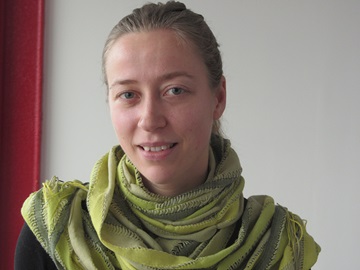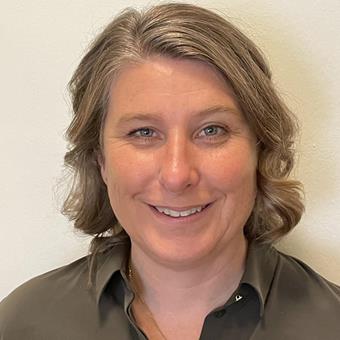Not even really big companies, like ABB and Ericsson, can have their own in-house experts in every area of technology. Technological developments also move so fast that the company is dependent on bringing in new ideas, and on development also taking place among their suppliers. Ms Melander, Division of Business Administration, Department of Management and Engineering, has studied how ABB and Ericsson work together with their main suppliers in six large strategic development projects.
 Foto: Monica Westman
Foto: Monica Westman
“They need to choose their collaborative partners carefully. A close partnership can also mean that you get locked into a particular technology; sometimes flexibility is the important thing,” she says.
The supplier might even be a large company that has other, competing technology and then it may also be difficult to open up.
“Close collaboration means that both sides need to be open and trusting of each other.
The suppliers are also chosen for different reasons: they might have a particular technology that the company wants access to, or the company might have good relations with a supplier who has the right competence.
“It’s not easy to sign good contracts with great technological uncertainty; not everything can be controlled, so both personal chemistry and trust are needed. A lot depends on personal contacts and relations. These are surprisingly important even when we are talking about really big companies,” she says.
Within a certain area there may not be a great number of suppliers to choose between – maybe two or three possible suppliers.
“The research has shown that strategic purchasing is becoming increasingly important, but in the development projects where the technological uncertainty is great, it is almost exclusively the development department that chooses the suppliers.”
It may seem logical, but on the other hand the development departments seldom have a great deal of competence in assessing suppliers:
“Of course it’s unfortunate to have to break off a collaborative partnership if, for example, it turns out the supplier doesn’t have sufficient production capacity or the ability to deliver the desired volumes,” she remarks.
In technology companies like Ericsson and ABB there are large development departments and relatively few people working on strategic purchasing.
“This must be a leadership issue – the creation of a good collaborative climate so that the skills inside a company are utilised. There are simple benefits to be had from improving internal cooperation,” she says.
She gives an example of how this cooperation might work: Ericsson wanted the industrial giant Intel to develop a component. This was a crucial project for Ericsson, and they needed to get access to the best technology available. For Intel, on the other hand, it was a small project among a mass of smaller and larger projects. In this case, the solution was for Ericsson’s upper management to meet Intel’s management in order to discuss long-term strategic collaboration – something that Intel were obviously keen to develop.
The dissertation“The whole project was in the hands of the supplier, demonstrating how important it is to find ways to develop a close relationship with a supplier you are dependent on,” says Ms Meander.
On 7 March she will defend her thesis, and the newly graduated doctor of engineering will then move to Gothenburg to work as a consultant at ÅF.
“They wanted to broaden their activities and I am looking forward to working on many different projects,” she says.
Supplier Involvement in New Product Development, under technological uncertainty. Lisa Melander, Department of Management and Engineering, Linköping University, 2014.
Division of Business Administration, Department of Management and Engineering
2014-02-25
Suppliers taking part
She found that the products become more innovative when the suppliers take part in the development process, when there is a creative, cooperative climate of openness and trust. But that is not always easy to achieve, and perhaps not appropriate in every case. Foto: Monica Westman
Foto: Monica Westman“They need to choose their collaborative partners carefully. A close partnership can also mean that you get locked into a particular technology; sometimes flexibility is the important thing,” she says.
The supplier might even be a large company that has other, competing technology and then it may also be difficult to open up.
“Close collaboration means that both sides need to be open and trusting of each other.
The suppliers are also chosen for different reasons: they might have a particular technology that the company wants access to, or the company might have good relations with a supplier who has the right competence.
“It’s not easy to sign good contracts with great technological uncertainty; not everything can be controlled, so both personal chemistry and trust are needed. A lot depends on personal contacts and relations. These are surprisingly important even when we are talking about really big companies,” she says.
Within a certain area there may not be a great number of suppliers to choose between – maybe two or three possible suppliers.
Purchasing important
Ms Melander was also interested in seeing how well internal cooperation between the development and purchasing departments worked.“The research has shown that strategic purchasing is becoming increasingly important, but in the development projects where the technological uncertainty is great, it is almost exclusively the development department that chooses the suppliers.”
It may seem logical, but on the other hand the development departments seldom have a great deal of competence in assessing suppliers:
“Of course it’s unfortunate to have to break off a collaborative partnership if, for example, it turns out the supplier doesn’t have sufficient production capacity or the ability to deliver the desired volumes,” she remarks.
In technology companies like Ericsson and ABB there are large development departments and relatively few people working on strategic purchasing.
“This must be a leadership issue – the creation of a good collaborative climate so that the skills inside a company are utilised. There are simple benefits to be had from improving internal cooperation,” she says.
She gives an example of how this cooperation might work: Ericsson wanted the industrial giant Intel to develop a component. This was a crucial project for Ericsson, and they needed to get access to the best technology available. For Intel, on the other hand, it was a small project among a mass of smaller and larger projects. In this case, the solution was for Ericsson’s upper management to meet Intel’s management in order to discuss long-term strategic collaboration – something that Intel were obviously keen to develop.
The dissertation“The whole project was in the hands of the supplier, demonstrating how important it is to find ways to develop a close relationship with a supplier you are dependent on,” says Ms Meander.
On 7 March she will defend her thesis, and the newly graduated doctor of engineering will then move to Gothenburg to work as a consultant at ÅF.
“They wanted to broaden their activities and I am looking forward to working on many different projects,” she says.
Supplier Involvement in New Product Development, under technological uncertainty. Lisa Melander, Department of Management and Engineering, Linköping University, 2014.
Division of Business Administration, Department of Management and Engineering
2014-02-25
